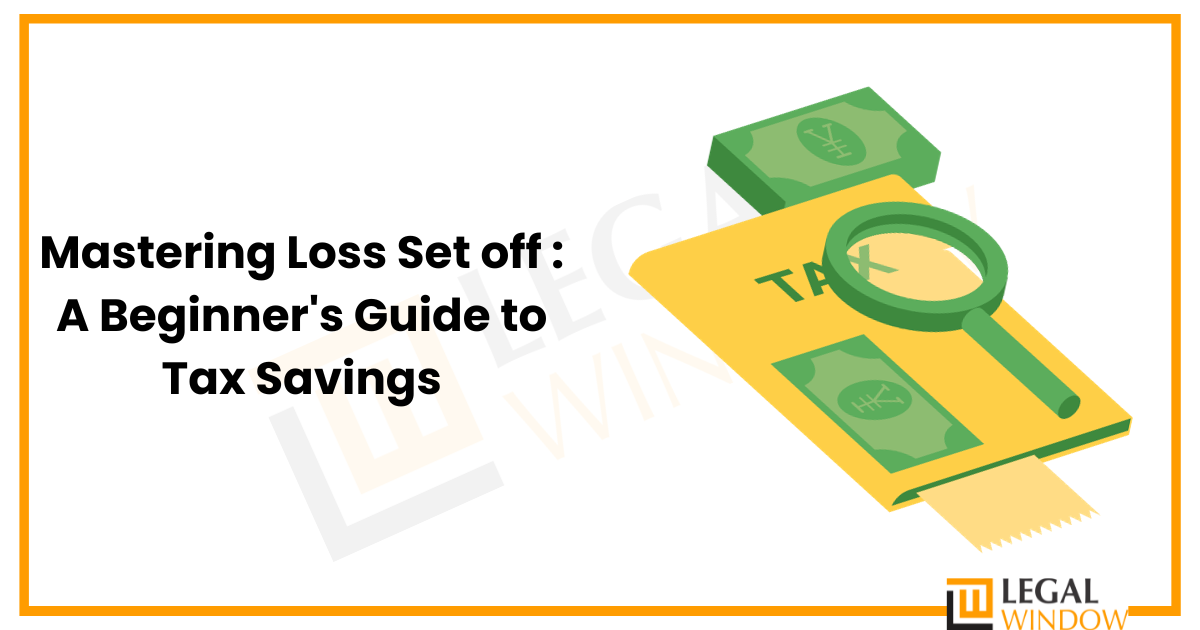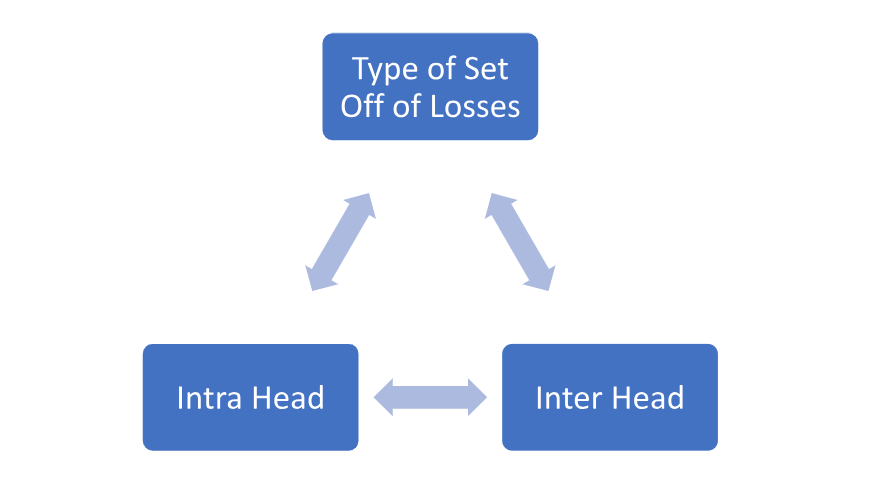
Imagine your income tax journey as a puzzle, and one crucial piece of that puzzle is Loss Set Off. Loss set off under the Income Tax Act, 1961 might sound complex, but it’s essentially a way to balance the scales when you’ve faced financial losses. In this blog, we’ll get to know about the loss set off, clarifying its importance and how it can help you navigate the world of taxes.
Table of Contents
Meaning of Set Off of Losses
The concept of set off losses & carry forward provision in Income Tax refers to the practice of offsetting losses against the profits or income generated within the same fiscal year & carries forward the remaining losses. Losses that are not offset against income in the current fiscal year can be carried over to future years for the purpose of offsetting against income in those subsequent years. There are two types of setoffs: intra-head set-offs and inter-head set-offs.
Types of Set Off of Losses
There are two types of Set Off of Losses:
- Intra Head Set Off: It is permissible to offset losses incurred from one source of income against money derived from another source within the same category of income. For example, it is possible to offset the losses incurred from Business A against the profits generated from Business B. In this scenario, Business A and Business B represent distinct sources of income, yet the shared category under which they fall is “Business”.
- Inter Head Set Off: Inter-head set-off refers to the process of offsetting a loss incurred under one income head against the profit earned under another income head. One possible scenario involves the utilization of losses incurred from a self-occupied living property to offset against income derived from salary. Prior to engaging in inter-head set-off, it is necessary for the taxpayer to initially engage in intra-head set-off.

Intra Head Set Off Exceptions
- The offsetting of losses incurred by a speculative business is limited to the profits generated by the same speculative enterprise. It is not possible to offset speculative business losses with income derived from any other business or profession.
- The deduction of losses incurred from the ownership and maintenance of racehorses is limited to offsetting against the profits derived from the same activity of owning and maintaining racehorses.
- The Long-term capital loss can be setoff only against long term capital gain, also short-term capital loss can only be set off against short- & long-term capital gain.
- Losses incurred by a specified business under section 35 AD shall only be offset against the profits generated by specified business entities. However, it is possible to offset losses incurred from other businesses or professions against revenues generated from the specified businesses.
Limits on how to make an adjustment of loss (set off).
- PGBP Loss: Nonspeculative business loss can be setoff only against salary income it can’t be set off from other income. Also, the offsetting of losses incurred by a speculative business is limited to the profits generated by the same speculative enterprise.
- Capital Gain Losses: The capital gain loss can’t be set off from any other head of income. The Long-term capital loss can be setoff only against long term capital gain, also short-term capital loss can only be set off against short- & long-term capital gain.
- House property loss: The House Property Loss can be setoff from any head of income. Starting from the assessment year 2018-19, individuals have the option to offset losses incurred under the category of ‘house property’ against any other source of income, up to a maximum limit of Rs. 2,00,000 for each assessment year. Nevertheless, it is possible to utilize unabsorbed losses in future years for offsetting purposes, in accordance with the regulations outlined in Section 71B.
- Crypto & other Virtual Digital Asset Trading Losses: The losses from crypto & VDA can’t be setoff from any other head of income and any other head losses can’t be set off from income of Crypto & VDA trading.
- The loss from any head can’t be setoff from the income from winning from card games, gambling, batting, winning from lotteries, cross word puzzle.
Carry forward of Losses
The loss remaining after the process of set off refers to the loss that a taxpayer is eligible to carry forward to subsequent years in order to offset against future incomes this is known as carry forward off losses in Income Tax. As an illustration, in the event that there is a still loss from a self-occupied house property after offsetting against other sources of income within and outside the same category, the taxpayer has the option to carry forward this loss for duration of 8 years.
This carried forward loss can then be utilized to offset against future revenue derived from house property. It is of utmost significance for the taxpayer to submit the Original Income Tax Return (ITR) within the stipulated deadline, as mandated by Section 139(1), in order to effectively transfer any incurred losses to subsequent fiscal years. Nevertheless, it is feasible to carry over a loss incurred under the category of House Property to subsequent years, even in cases when the taxpayer submits a Belated Income Tax Return (ITR) as per the provisions of Section 139(4). The set off & carry forward of losses is of great help to the taxpayers.
Conclusion
In simple terms, Loss set off is your financial safety net in the world of income tax. As we wrap up this, remember that it’s not about avoiding taxes, but about using smart strategies to cope with financial ups and downs. By understanding loss set off, you gain a valuable tool that can help secure your financial future and make your tax journey a little less daunting. So, stay informed, seek guidance if needed, and make the most of this to achieve your goals and save your taxes.
CA Pulkit Goyal, is a fellow member of the Institute of Chartered Accountants of India (ICAI) having 10 years of experience in the profession of Chartered Accountancy and thorough understanding of the corporate as well as non-corporate entities taxation system. His core area of practice is foreign company taxation which has given him an edge in analytical thinking & executing assignments with a unique perspective. He has worked as a consultant with professionally managed corporates. He has experience of writing in different areas and keep at pace with the latest changes and analyze the different implications of various provisions of the act.
Categories
- Agreement Drafting (23)
- Annual Compliance (11)
- Change in Business (36)
- Company Law (148)
- Compliance (90)
- Digital Banking (3)
- Drug License (3)
- FEMA (17)
- Finance Company (42)
- Foreign Taxation (6)
- FSSAI License/Registration (14)
- GST (118)
- Hallmark Registration (1)
- Income Tax (200)
- Latest News (34)
- Miscellaneous (164)
- NBFC Registration (8)
- NGO (14)
- SEBI Registration (6)
- Section 8 Company (7)
- Start and manage a business (21)
- Startup/ Registration (128)
- Trademark Registration/IPR (40)
Recent Posts
- Post incorporation compliances for companies in India April 30, 2024
- Startup’s Guide to Employee Stock Ownership Plans April 29, 2024
- Master Secretarial Audit: A Complete Compliance Guide April 27, 2024
About us
LegalWindow.in is a professional technology driven platform of multidisciplined experts like CA/CS/Lawyers spanning with an aim to provide concrete solution to individuals, start-ups and other business organisation by maximising their growth at an affordable cost.









